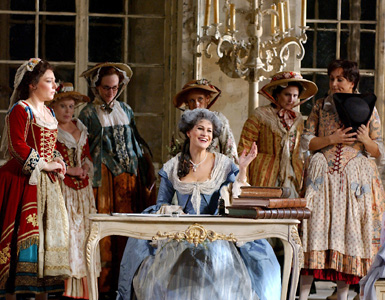Libretto is the text of a vocal work in music. Librettos are an important part of operas and oratorios. The libretto of a musical comedy is often called the book. The word libretto is Italian and literally means little book. The author of a libretto is called a librettist. Many librettists are talented writers who produce original material of great literary merit. Some librettos are excerpts from existing literary works, such as the Bible. Some composers wrote their own librettos. Notable examples include Germany’s Richard Wagner (1813-1883), Italy’s Ruggero Leoncavallo (1887-1919), and the United Kingdom’s Sir Michael Tippett (1905-1998).
The first known operatic libretto was written by the Italian poet Ottavio Rinuccini for a stage work called La Dafne (1597), with music by the Italian composer Jacopo Peri, for performance in Florence. See Opera (The development of opera). La Dafne is now regarded as the world’s first opera, but its music has been lost.
Many librettists have made major contributions to the world’s greatest operas and other vocal works. The Italian poets Pietro Metastasio (1698-1782) and Lorenzo da Ponte (1749-1838) wrote texts for operas by the Austrian composer Wolfgang Amadeus Mozart. The French playwright Augustin Eugene Scribe (1791-1861) worked with many composers, notably Daniel Auber of France (1782-1871) and Giacomo Meyerbeer of Germany (1791-1864). The Italian librettist Felice Romani (1788-1865) did his most important work with the opera composers Gaetano Donizetti and Vicenzo Bellini, both also Italian. The Italian librettists Francesco Maria Piave (1810-1876) and Arrigo Boito (1842-1918) both provided texts for the opera composer Giuseppe Verdi. The Italian playwright Luigi Illica (1857-1919) wrote or collaborated on librettos for many opera composers of the period. Illica is best known, however, for his work with the Italian dramatist Giuseppe Giacosa (1847-1906) on the Italian composer Giacomo Puccini‘s Tosca, La Bohème, and Madama Butterfly. Such librettists as Boito and Austria’s Hugo von Hofmannsthal (1874-1929) provided librettos for the German composer Richard Strauss.

During the 1900’s, poets, including the English-born American poet W. H. Auden (1907-1976), and playwrights, including the German dramatist Bertolt Brecht (1898-1956), provided high-quality librettos. Librettists active in the later 1900’s included the United Kingdom’s Eric Crozier (1914-1994) and South Africa’s William Plomer (1903-1973), who each worked on operas with the British composer Benjamin Britten.
